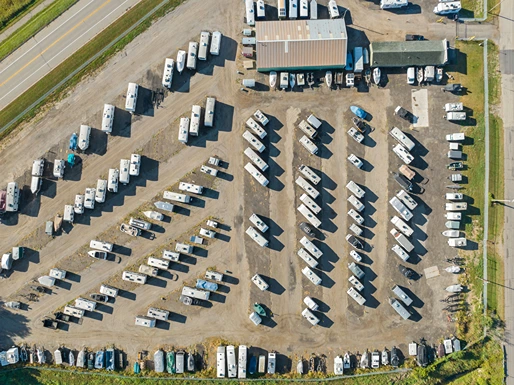When the boating season winds down, it’s time to think about off-season boat storage. This step can help protect your boat, but it requires careful planning. By preparing in advance, you can reduce risks and maintain the boat’s condition, making the next season more enjoyable.

Why Prepping for Boat Storage Matters
Prepping your boat for storage isn’t just about putting it away. It’s about making sure it remains in the best possible shape during the off-season. Boats, like any other vehicle, face exposure to elements that could cause issues over time. But with proper steps, you can reduce the likelihood of these problems. It’s important to take care of the hull, the engine, and even the interior, so everything remains in top condition.
Steps for Effective Boat Storage Preparation
Taking a few key steps when preparing your boat for storage might make a difference. Below, we’ll break down some general guidelines that may be useful for off-season boat storage.
1. Clean the Boat Thoroughly
Cleaning is the first and perhaps most important step. A clean boat is less likely to develop issues during storage. Start by washing the exterior with mild soap and water. Removing dirt, salt, and debris can help prevent corrosion. Make sure to rinse well to remove any residue.
For the interior, wipe down all surfaces and vacuum carpets or seats. Check compartments for leftover food or items that could attract pests. By keeping the boat clean, you might avoid unpleasant surprises when you open it back up.
2. Inspect and Protect the Hull
The hull is exposed to many elements throughout the boating season. Before storing the boat, inspect it for any cracks, chips, or damage. While these might seem minor, they could worsen over time. Repairing these before storage could prevent further issues.
Applying a layer of wax may also offer some protection. It could act as a barrier, helping shield the hull from moisture and contaminants. This step may prove beneficial, especially when storing the boat outdoors.
Call us NOW to secure your boat in Mason City RV and Boat Storage. We’ve literally got you covered!
3. Flush and Treat the Engine
Engines need special attention before storage. Flushing the engine helps remove salt, dirt, and other impurities that might build up during use. Most engines come with specific instructions for flushing, so following the manual can be a good idea.
After flushing, consider using a fuel stabilizer. Adding this product to the fuel tank may prevent fuel breakdown during the off-season. It could also help in reducing the risk of condensation, which might cause engine problems. Running the engine for a few minutes with the stabilizer can circulate it effectively.
4. Drain and Lubricate the Boat’s Systems
Draining systems, such as the water tanks, bilge, and plumbing, can help reduce the risk of freezing damage. Once drained, lubricating parts like the steering mechanism and other moving components may keep them in good shape. Doing this may ensure that everything remains functional when it’s time to use the boat again.
5. Take Care of the Battery
Removing the battery for storage is often recommended. This step may protect it from temperature extremes and prevent draining. Storing the battery in a cool, dry place and charging it periodically can help keep it ready for the next season.
If removing the battery is not an option, disconnecting it might still be beneficial. Keeping it clean and ensuring that it’s in a state that minimizes wear during the off-season could be essential.
6. Cover the Boat Properly
A cover can provide an extra layer of protection, especially if the boat will be stored outside. Using a fitted, high-quality cover may keep out dust, moisture, and pests. If the boat is stored indoors, a cover could still be useful for keeping the interior clean and protected.
Ensure the cover is secured tightly, and check it periodically throughout the off-season. Adjusting the cover as needed can help maintain its effectiveness.

Storage Options and Considerations for Boat Storage
Boat storage comes in various forms, and choosing the right option may depend on your needs. The main options typically include indoor storage, outdoor storage, and dry stack storage. Each has its own advantages, so understanding them could help you decide which one works best.
Indoor Boat Storage
Indoor storage often provides more protection from the elements. This option can be beneficial, as it may reduce exposure to rain, snow, and extreme temperatures. However, it can also be more expensive, and space may be limited. If you choose indoor storage, it’s important to make sure the boat is properly covered and prepared, as indoor environments may still present some risks.
Outdoor Boat Storage
Outdoor storage is another common choice. It’s typically more affordable and may be easier to find, but it also comes with certain challenges. Exposure to weather conditions, pests, and temperature fluctuations are all factors to consider. Using a high-quality cover and taking extra precautions, like winterizing the engine, may help mitigate these risks.
Dry Stack Storage
Dry stack storage offers a compromise. It keeps the boat elevated, which can reduce moisture exposure. Storing the boat in a covered dry stack facility may also limit exposure to harsh weather. However, accessing the boat during the off-season could be more challenging, and these facilities may have specific requirements for boat size and weight.
Checking on the Boat During the Off-Season
Even when a boat is stored properly, checking on it periodically throughout the off-season can be beneficial. This allows for early detection of any issues that may arise. Look for signs of moisture, pests, or wear that might need attention. If the boat is stored outdoors, make sure the cover remains in place and adjust as needed.
Maintaining Insurance Coverage
Maintaining insurance coverage during the off-season may be wise. Boats are still susceptible to damage or theft while in storage. Reviewing your insurance policy and making necessary adjustments could offer some peace of mind. Some policies might offer discounts or specific coverage options for off-season storage, so exploring these could be beneficial.
Preparing for the Next Boating Season
Once the off-season comes to an end, getting the boat ready for the new season might require some attention. This could include recharging the battery, checking fluids, and inspecting the hull for any damage that might have occurred during storage. It’s important to approach this step with the same care as the storage preparation, as it may set the tone for a trouble-free season.
Final Thoughts on Boat Storage
Boat storage for the off-season may seem like a daunting task, but with proper preparation, it could be manageable. By taking these steps, you may keep your boat in good condition, making it easier to enjoy the next season. Remember, while no method can guarantee complete protection, taking precautions could minimize risks.
Do you want to ensure your boat stays safe and well-maintained while you’re away? Reach out to us HERE to learn more about our boat storage options in Mason City, Iowa, and secure your spot today!
Disclaimer:
The information provided is intended for educational purposes only and should not be taken as advice nor are there guarantees of any kind.


